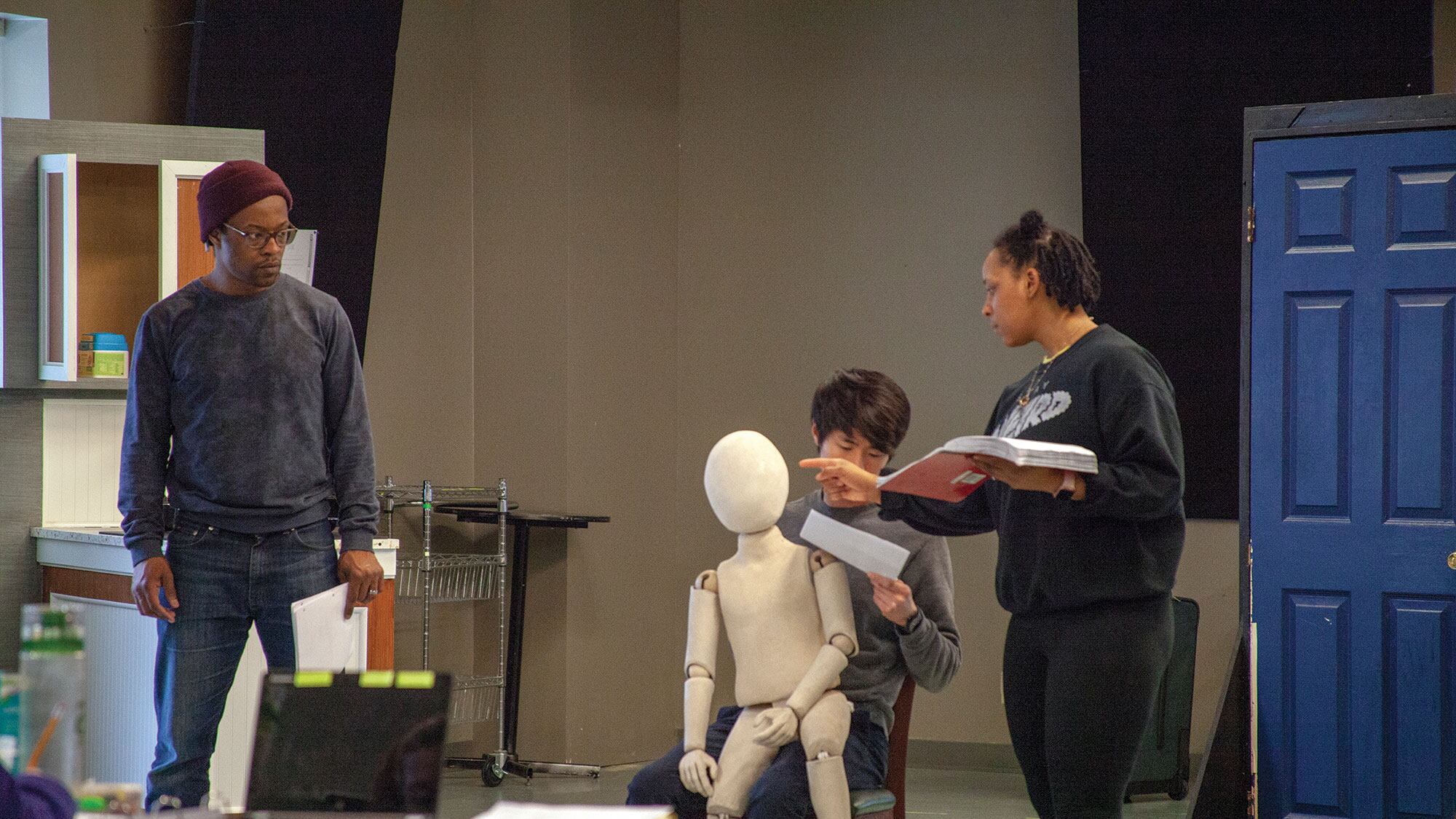It's only a few weeks before Wolf Play premieres at Artists Repertory Theatre, but playwright Hansol Jung still isn't totally sure what the production will look like.
Wolf Play is about an adopted boy from South Korea who thinks he is a wolf. When his American parents unexpectedly become pregnant, the father (Chris Harder) goes online to find new parents for Wolf, and eventually sends him to live with a lesbian couple (Tamera Lyn and Ayanna Berkshire)—one of whom has been desperately reaching for motherhood, the other not so much. Wolf will represented by a puppet operated by actor Christopher Larkin.
Beyond that, the play is still taking shape. "I'm still figuring out who this guy is, what this play is," Jung tells WW during a break between rehearsals in preparation for Wolf Play's March 16 world premiere. "I don't yet know how it will be onstage, in this space, or what scenes will have the most impact, until I see this performed in front of an audience. But I'm excited, because I know I've never seen anything like this before."
That's saying something, since Jung has seen a lot. Born in Jeonju, South Korea, she moved to South Africa at age 6, then back to Korea just in time to start high school with a cross-continental accent. Jung earned an MFA in playwriting from Yale School of Drama and moved to New York in 2010. Since then, she has left a trail of fellowships, artist's residencies and premieres of critically acclaimed works. She has translated more than 30 English musicals into Korean, including Evita, Dracula and Spamalot. Recently, Jung translated Romeo and Juliet for the Oregon Shakespeare Festival.
Asked if she took anything from her own experiences when creating a young, vulnerable character relocated by parents' choices, Jung says she doesn't see a correlation."I felt a sense of displacement and needing a coping mechanism, sure, but I had a family with me," she says. "Feeling uprooted is relatable, but I'm not adopted nor married. I've always had my family."
The boy in Wolf Play, on the other hand, experiences multiple families—constructed and accidental. Through his adoptive father's choice to relocate him now that his wife is pregnant, and through question of what parents mean to children and what the definition of a parent is, the story disrupts all notions of traditional, nuclear families and parental love.
"The idea of a conventional family is changing, across the world," says Jung. "Families are moving beyond biological connections. I want to ask what makes a family today, who we consider family and why."
It's a question Jung has asked before. Her 2018 Whiting Award-winning play, Wild Goose Dreams, is a story about one of Korea's "goose fathers," a Korean man who works in Korea while his wife and children live and prosper in America. Wild Goose posited a similar inquiry to audiences, and pressed ideas of paternal duty and multicultural, internet-connected families.
"Though I was raised in a close-knit family, wherever I am, I'm in a middle space where I'm not quite at home," she says. "It's always a readjustment when I visit family in Korea or return home to the U.S."
That dichotomy of a disconnected life in two very different cultures inspires much of Jung's familial inquiry. She notes that both countries share conservative roots with close-knit nuclear households, and time is changing traditional notions—though not always at the same speed.
"There is still a lot of stigma around adoption in Korea. Single-parent households are still frowned upon," says Jung. "Adoption is much more normalized in America. Culture moves faster here, with so many different kinds of people living together. I don't know any gay households in Korea, I'm not even sure it's legal." It isn't.
Jung hopes to shed light on the differences and similarities between people who choose to be families, versus a family coming into creation through accident. Wolf Play asks whether blood ties still matter if they're accidental, compared to a family that is assembled, through adoption and participation, "an act of cultivation."
While Jung is building a modern, ethereal concept of family in her script, director Dámaso Rodríguez is hard at work bringing the equally unconventional characters to life. While traditional puppeteers are invisible onstage, Larkin will be as much a part of Wolf's character as the puppet. One of the characters is a boxer, and real scenes with actors boxing had to be choreographed.
Despite her anticipated avant-garde premiere on the horizon, Jung has zero expectations or takes on which scenes, characters or staging will connect with the audience. This play exists in the moment more than on the pages.
"The Wolf has a relationship with the audience, which is an integral part of the reveal and the overall impact," she says. "So I'm more excited to meet the audience, because that's when the Wolf will come to life."
SEE IT: Wolf Play is at Artists Repertory Theatre, 1515 SW Morrison St., artistsrep.org. 7:30 pm Tuesday-Sunday, 2 pm Sunday, March 10-April 7. $30-$60.

Five of Portland's Best Visual Arts Shows to See This Spring
Five Portland Performances You Shouldn't Miss This Spring
The Five Best Dance Productions to See in Portland This Spring
"Survival Math" Chronicles the Crime and the Community of Northeast Portland in the Late '80s

